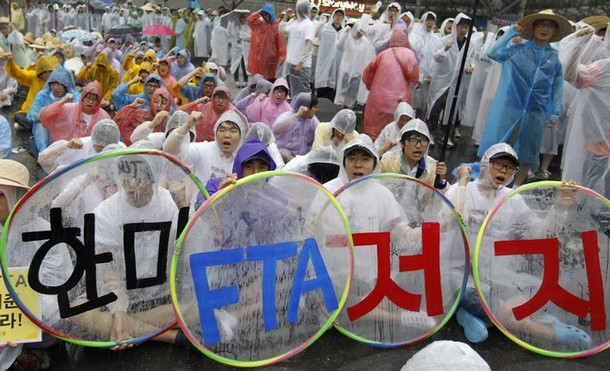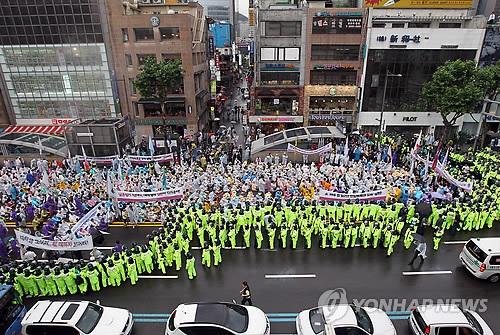Thousands march in Seoul over free trade deal with US, college tuitions

Yonhap | 2011/06/29
Thousands march in Seoul over free trade deal with U.S., college tuitions
SEOUL, June 29 (Yonhap) — Braving heavy rains, more than 15,000 people staged simultaneous rallies in central Seoul Wednesday against a free trade deal with the United States, high college tuitions and various sensitive labor issues.
The marching protesters took over all lanes of Kwanghwamun street, which leads to the presidential office, the Blue House. It was the first time that protesters have wholly occupied the main street since mass protests in 2008 and 2009, which were staged against imports of U.S. beef and in commemoration of the death of former President Roh Moo-hyun, respectively.
While protest organizers said the number of participants amounted to 15,000, police said they totaled 6,000.
About 2,000 college students and members of the national farmers’ union gathered at a public square next to the Seoul train station, calling for the government to stop ratifying its free trade agreement (FTA) with the U.S. and to cut tuition costs.

The trade deal, signed in 2007 and supplemented last December, has been awaiting approval from the legislatures of the two countries. Opposition parties have been calling for renegotiating the deal, saying the pact favors the U.S. Farmers argue the deal may pummel the local farming industry by bringing in cheaper foreign farm produce.
But the ruling Grand National Party (GNP) has recently vowed to pass the ratification bill during an extra parliamentary session in August.
"Excessive imports of custom-free products and (ill-conceived) price stabilization policies resulted in an unprecedented 80 percent plunge in agricultural goods," the farmers’ federation said. "We urge the government to come up with measures for farmers who are plagued by high-rocketing production costs and plunges in farm products."
Thousands of labor union members also took to the streets in the capital, demanding an increase in the statutory minimum wage and a revision of a labor law that exempts companies from paying wages to full-time labor union executives and allows multiple labor unions at a single workplace.
Thousands of riot policemen were dispatched to watch for potential violence at the protest sites, but no injuries were reported.
Police pledged to take stern actions if the protests escalate into violence.
The rallies were timed with the day in 1987 when Roh Tae-woo, then a ruling party candidate for presidency, announced the introduction of a direct presidential election system and other reform plans, bowing to mounting nationwide pro-democracy protests against the iron-fisted rule of then-President Chun Doo-hwan.
The day is considered a landmark in South Korea’s history of democracy.





